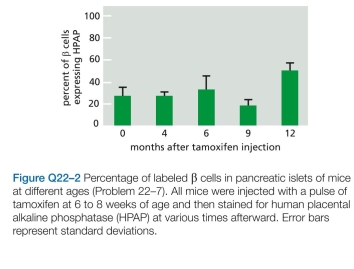
Molecular Biology Of The Cell 6th Edition by Bruce Alberts, Alexander Johnson, Julian Lewis, David Morgan, Martin Raff, Keith Roberts, Peter Walter
Edition 6ISBN: 978-0815345244
Molecular Biology Of The Cell 6th Edition by Bruce Alberts, Alexander Johnson, Julian Lewis, David Morgan, Martin Raff, Keith Roberts, Peter Walter
Edition 6ISBN: 978-0815345244 Exercise 5
The origin of new  cells of the pancreas-from stem cells or from preexisting
cells of the pancreas-from stem cells or from preexisting  cells-was not resolved until a decade ago, when the technique of lineage tracing was used to decide the issue. Using transgenic mice that expressed a tamoxifen-activated form of Cre recombinase under the control of the insulin promoter, which is active only in
cells-was not resolved until a decade ago, when the technique of lineage tracing was used to decide the issue. Using transgenic mice that expressed a tamoxifen-activated form of Cre recombinase under the control of the insulin promoter, which is active only in  cells, investigators could remove an inhibitory segment of DNA and thereby allow expression of human placental alkaline phosphatase (HPAP), which can be detected by histochemical staining. After a pulse of tamox- ifen that converted about 30% of
cells, investigators could remove an inhibitory segment of DNA and thereby allow expression of human placental alkaline phosphatase (HPAP), which can be detected by histochemical staining. After a pulse of tamox- ifen that converted about 30% of  cells in young mice to cells that express HPAP, the investigators followed the per- centage of labeled
cells in young mice to cells that express HPAP, the investigators followed the per- centage of labeled  cells for a year, during which time the total number of
cells for a year, during which time the total number of  cells in the pancreas increased by 6.5- fold. How do you suppose the percentage of
cells in the pancreas increased by 6.5- fold. How do you suppose the percentage of  cells would change over time if new
cells would change over time if new  cells were derived from stem cells? What if new
cells were derived from stem cells? What if new  cells were derived from preexisting
cells were derived from preexisting  cells? WFigure Q22.03/Q22.01hich hypothesis do the results in Figure Q22-2 support?
cells? WFigure Q22.03/Q22.01hich hypothesis do the results in Figure Q22-2 support? 
 cells of the pancreas-from stem cells or from preexisting
cells of the pancreas-from stem cells or from preexisting  cells-was not resolved until a decade ago, when the technique of lineage tracing was used to decide the issue. Using transgenic mice that expressed a tamoxifen-activated form of Cre recombinase under the control of the insulin promoter, which is active only in
cells-was not resolved until a decade ago, when the technique of lineage tracing was used to decide the issue. Using transgenic mice that expressed a tamoxifen-activated form of Cre recombinase under the control of the insulin promoter, which is active only in  cells, investigators could remove an inhibitory segment of DNA and thereby allow expression of human placental alkaline phosphatase (HPAP), which can be detected by histochemical staining. After a pulse of tamox- ifen that converted about 30% of
cells, investigators could remove an inhibitory segment of DNA and thereby allow expression of human placental alkaline phosphatase (HPAP), which can be detected by histochemical staining. After a pulse of tamox- ifen that converted about 30% of  cells in young mice to cells that express HPAP, the investigators followed the per- centage of labeled
cells in young mice to cells that express HPAP, the investigators followed the per- centage of labeled  cells for a year, during which time the total number of
cells for a year, during which time the total number of  cells in the pancreas increased by 6.5- fold. How do you suppose the percentage of
cells in the pancreas increased by 6.5- fold. How do you suppose the percentage of  cells would change over time if new
cells would change over time if new  cells were derived from stem cells? What if new
cells were derived from stem cells? What if new  cells were derived from preexisting
cells were derived from preexisting  cells? WFigure Q22.03/Q22.01hich hypothesis do the results in Figure Q22-2 support?
cells? WFigure Q22.03/Q22.01hich hypothesis do the results in Figure Q22-2 support? 
Explanation
Hematopoietic stem cells have the capaci...
Molecular Biology Of The Cell 6th Edition by Bruce Alberts, Alexander Johnson, Julian Lewis, David Morgan, Martin Raff, Keith Roberts, Peter Walter
Why don’t you like this exercise?
Other Minimum 8 character and maximum 255 character
Character 255


